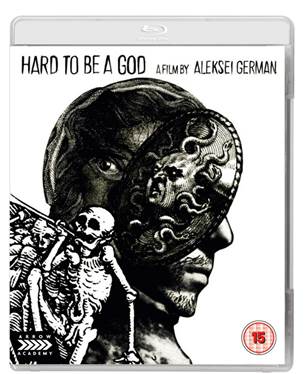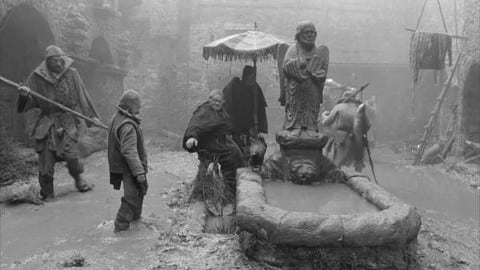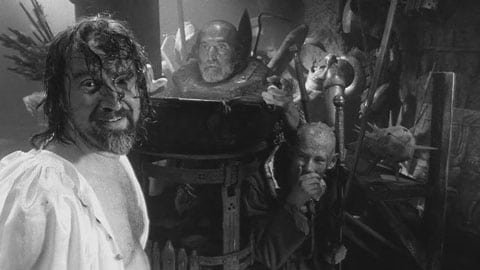Hard To Be A God (2013)
Directed by: Aleksey German
Written by: Aleksey German, Arkadiy Strugatskiy, Boris Strugatskiy, Svetlana Karmalita
Starring: Gali Abaydulov, Leonid Yarmolnik, Remigijus Bilinskas, Valeriy Boltyshev
Russia
AKA TRUDNO BYT BOGOM
ON BLU-RAY AND DVD: NOW, from ARROW ACADEMY
RUNNING TIME: 177 min
REVIEWED BY: Dr Lenera, Official HCF Critic
30 scientists travel from Earth to a nearly-identical alien planet that is culturally and technologically centuries behind. The inhabitants of this planet have brutally suppressed a renaissance movement, murdering anybody they consider to be an intellectual, and thus the planet is stuck in the middle ages. Anton, one of the scientists from Earth, is sent to infiltrate the local populace of the Kingdom of Arkanar and help them progress as a society, although he is forbidden from getting involved with local politics, forcibly interfering with the advancement of technology or culture, or killing. He assumes the identity of a nobleman called Don Rumata whom some think is a God, but finds it increasingly hard not to intervene as civil war is brewing….
This is one strange film, no doubt about it, and to be honest not a film I enjoyed or liked very much, though it’s certainly one I admired, certain aspects being very impressive. The three hour Medieval [okay, the basic plot is science fiction and one you may find in an old episode of Star Trek, but the science fiction angle is quickly forgotten about] epic is in no way easy viewing and in fact I found it something of a chore in places, its director’s desire to immerse the viewer in the amazingly detailed Pieter Bruegel-style world he’s created, and in particular the ugliness of this world with the film almost coming across as a phantasmagoric mix of shit, piss, snot, mud and blood, seemingly overriding everything else and almost alienating the viewer despite the camera constantly getting up close to everything. This is one of those films I wanted to love, but ended up finding it something of an endurance test despite its important themes of control, interventionism, religion and persecution, particularly the way religious fundamentalism subjects thought, imagination and progress, which make the film seem very timely even though the original novel, which I’d certainly like to read, was largely inspired by events in Russia, especially during the 1930’s when intellectuals and freethinkers were persecuted. If you fancy a challenge and something very different, Hard To Be A God is a good film to try, and technically it’s a total triumph, but after a while I started checking the time, not something I often do during a film because I like to immerse myself in whatever I’m watching.
Director Aleksie German only completed five feature films throughout his filmmaking career which began in 1967. His fiercely political projects often met with production difficulties or opposition, while the first four pictures he did make were banned until Mikhail Gorbachev became leader of the Soviet Union. German was actually interested in Arkady and Boris Strugatsky’s novel Hard To Be A God in 1968 but just before production was due to commence Russia invaded Czechoslovakia and the film was shut down due to its parallels with what was going on. He tried to revive the project several times after, and was eventually beaten to it by Peter Fleischmann, who made his own adaptation in 1989, though the Strugatsky’s weren’t too pleased with this version which seemed to turn the book into a more conventional fantasy adventure. German finally started work on his version in 2000. The Arkanar City set was constructed in the vicinity of Tocník castle, Czech Republic, while other bits and pieces were filmed in Moscow. German spent six years shooting the film, often pushing cast and crew to their limits, then a further seven years to edit the film, with German actually dying in 2013 before completion. His son Aleksei German Jr, also a respected filmmaker, helped put the finishing touches to it, largely special effects and sound tweaks, alongside his mother Svetlana Karmalita, before finally premiering at the 2013 Rome Film Festival. Soviet response was mixed but it did quickly gain a strong reputation internationally.
The opening shot of the film is somewhat deceptive, a beautiful, painterly view of a mountain village overhanging a snow-covered lake, before we switch to, in total contrast, a filthy street where two characters get happily splashed with excrement by a man using his first floor window as a latrine. Over all this some narration tells us a bit of background, though it doesn’t make things very clear, and I occasionally had to rewind some bits of the film so I picked up the plot, which German decides to make quite hard to discern. We’re introduced to [well, I wouldn’t go so far as to call him the film’s hero as this film has no heroes] its main protagonist Anton, in his guise as Don Rubato. He awakes from his sleep, where he often hears his grandmother’s voice from Earth, and plays the saxophone, to the consternation of his chief servant, a moment which is nicely bookended at the end of the film. Then he steps out into the streets, and it’s a brutal, repressive world he’s in. The prime minister of Arkanar Don Reba is tyrannical and his militia, known as the Greys, like to go round and kill, as they call them,“smartarses”. We see, in an echo of Fahrenheit 451, some books and letters being burnt, then a writer being seized and drowned. Anton ensures, at great risk, that things are smuggled into Arkanar to try to make them move forward, but is [for some reason] not allowed to take any direct action. However, there’s a band of religious zealots called the Blacks who want to rid the area of the Greys but prove to be just as repressive, and you can just feel that, at some point, Anton will have to go against his principals, even though he has to maintain his façade as a God, wondering around the area and impressing folk with simple tricks, though one wonders why he continues to do this after a while.
Then again, Anton behaves oddly throughout, often grabbing people by the nose in a film where characters are being constantly rough and rude to others and each other for no obvious reason. Much of the film’s running time is taken up with Anton wondering around interacting with people, some of them other Earth folk, in scenes which often seem irrelevant and just put there because German wants to tell us how disgusting this world is. It is extraordinarily convincing and makes even the supposedly grittier Hollywood Medieval-set movies seem falsely glamorous and clean, but after a while I tired of all the farting, spitting, mud etc. and wished that the film would either explore the intellectual aspects of its premise or at least provide some warmth. Anton has a wife, but even their relationship is somewhat weird as well as very cold. It doesn’t help that many of the performers have been asked to overact wildly, almost as if they were in a silent film. Everyone seems to be insane too, to the point that some people make crazy faces into the cameras, and we certainly get a sense of a world gone mad, but it becomes exhausting and undermines the tension which should be provided by premises like civil war, a repressive society and a main character pretending to be a God but on the verge of being found out. German likes to have some important events occur partially or entirely off-screen, which is certainly an interesting device, but it doesn’t always work too well when he’s obviously more interested in stuff like, for example, a man who is having trouble peeing.
Despite a great deal of bloody kills and even some gut spilling, there is a certain humour to some of the proceedings, some of it satirical, some of it scatological, though overall Hard To Be A God is a very dark, cynical film. Its attacks on things such as religion [though interestingly there is no obviously Christian iconography despite mentionings of a God and a Creator] and ignorance, plus its depiction of Fascism and how one group can quickly become as bad as they group they’re replacing, are obvious and do carry considerable weight though I wished the film had explored Anton’s moral dilemma more. Some of the most enjoyable moments are when Anton has to convince various people that he actually is a God, something which is usually ridiculously easy to do [though why does he often put stuff – tar, mud, whatever – on his face?] and really does have parallels with some of what is going on in the world today. However, it’s very hard to care about the character. We are rarely given any clues as to what is going on inside his head until near the end, though the ending has a certain poignance.
The best thing about the film for me though is the cinematography by Vladimir Ilin and Yuriy Klimenko which is simply stunning, the camera seeming to hardly ever stay still as it glides around picking up every dirty, ugly thing and happening that it can, and rarely pulling back, giving us an acute feeling of claustrophobia, something aided by the fact that people are simply everywhere, even in Don Rumata’s bedroom, constantly getting in the way or lurking on the sides of the screen. There’s much use of deep focus, and certain shots which almost seem to pushing the limits of black and white photography as far as it can go, like a lengthy shot of Anton standing in a shaft of light. Sound is also expertly employed, with many words not being heard clearly. Leonid Yarmolnik is very charismatic in the lead role though I’ll be surprised if he always understood what his character is supposed to be doing or thinking. As I’ve already said, I didn’t enjoy Hard To Be A God much, and I can’t help but think that the story deserves another going over [guess I need to see the 1989 version too] where it doesn’t threaten to sink in loads of mud, but its images of a stark, squalid, filthy Medieval world certainly won’t leave my mind for some time.
Rating: 









Arrow Academy bring Hard To Be A God to Blu-ray with a brilliantly pristine transfer showcasing the astonishing cinematography of the film very well. The special features, which include an interview with the director’s son and a look at the film which will actually explain the plot if you weren’t quite able to pick it up from watching the film, certainly illuminate this hugely flawed, but highly interesting, work.
BLU-RAY SPECIAL FEATURES:
*High Definition Blu-ray (1080p) presentation
*Original Russian 5.1 DTS-HD Master Audio Surround Sound
*Optional English subtitles, revised especially for this edition
*Introduction by co-screenwriter Svetlana Karmalita
*Exclusive interview with Aleksei German Jr, who completed his father’s film after his death
*The History of the Arkanar Massacre, an appreciation of the film by Daniel Bird
*The Unknown Genius: Michael Brooke looks at Aleksei German’s creatively dazzling but politically troubled career
*Extensive galleries of film and behind-the-scenes stills
*Theatrical trailer
*Reversible sleeve featuring original and newly commissioned artwork by Andrzej Klimowski
*Limited Edition booklet featuring new writing on the film and more!
DVD SPECIAL FEATURES:
*Dolby Digital 5.1 Surround Sound
*Optional English subtitles, revised especially for this edition
*Introduction by co-screenwriter Svetlana Karmalita
*Exclusive interview with Aleksei German Jr., who completed his father’s film after his death
*Theatrical Trailer





Be the first to comment